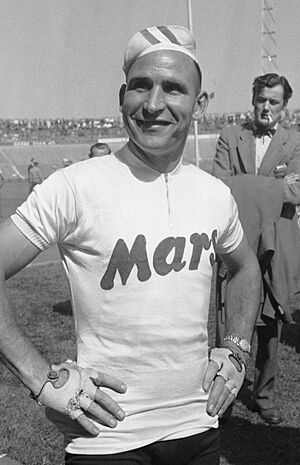Wim van Est facts for kids

Van Est in 1956
|
|||
| Personal information | |||
|---|---|---|---|
| Nickname | The Executioner, Iron William, The Locomotive | ||
| Born | 25 March 1923 Fijnaart, Netherlands |
||
| Died | 1 May 2003 (aged 80) Sint Willebrord, Netherlands |
||
| Team information | |||
| Discipline | Road | ||
| Role | Rider | ||
| Major wins | |||
|
|||
Willem "Wim" van Est (born March 25, 1923 – died May 1, 2003) was a famous Dutch racing cyclist. He is best known for two things. First, he was the first Dutch cyclist to wear the yellow jersey in the Tour de France in 1951. This jersey shows who is leading the race. Second, he became famous for falling into a deep ravine while wearing that very yellow jersey!
Contents
Wim van Est's Early Life
Wim van Est was born in Fijnaart, a town in the Netherlands. He was the second of 16 children in his family. His family faced tough times and poverty after World War One. They lived on a simple, makeshift farm.
During World War 2, when he was a teenager, Wim started cycling long distances. He would travel into Belgium to smuggle goods like tobacco and cheese. He traded these for soap, which he then sold back home. This was a way for his family to get by during the war. He was caught doing this and spent some time in prison.
After this, while the Nazis occupied his homeland, Wim got the idea to cycle for sport. When the war ended and races started again, he saw a local race. He felt he could beat everyone. It took him five years to become a professional cyclist.
Starting His Cycling Career
Wim began his cycling journey as an amateur in 1946. A professional runner saw him race and was impressed. Wim's first big win came in 1950. He won the long 600-kilometer Bordeaux–Paris race.
The Famous Tour de France Fall
In 1951, Wim van Est joined the Dutch team for the 1951 Tour de France. This was his first time ever seeing such big mountains. He had never ridden up or down them before.
Wearing the Yellow Jersey
In the 12th stage of the Tour, Wim broke away from the main group. He won the stage and gained a lot of time on the race leader. This was enough for him to take first place overall. He became the first Dutchman to wear the yellow jersey. Everyone back home was very proud of him.
The Fall Down the Ravine
The very next day, Wim was trying to keep his lead. He was chasing other riders down a mountain called the Col d'Aubisque. He was following a strong rider named Fiorenzo Magni. Wim had a flat tire, and the road was tricky with melting snow and loose stones. He lost control of his bike and went over the edge of a cliff.
Wim fell about 70 meters (200 feet) down the ravine. He tried to grab small trees to slow his fall. Luckily, he managed to grab onto a small tree and land on a narrow ledge. He was stuck, unable to climb up or down.
Rescue from the Cliff
Wim started screaming for help. Another cyclist, Roger Decock, saw him fall and stopped to help. The Dutch team car arrived, and they eventually found Wim's location. It took them a long time to tie together all their spare tire tubes to make a rope. Their 75-meter "rope" finally reached Wim. He used the tubes to make a harness around his chest.
With the help of spectators and his team manager, Wim was pulled back up to the road. He wanted to keep riding, but everyone convinced him to go to the hospital. He had just fallen a long way!
A Famous Advertisement
Back home, Wim's fame grew even more. A Belgian watchmaker called Pontiac had given watches to the Dutch team. They started a famous advertisement that said: "Seventy meters deep I dropped, my heart stood still but my Pontiac never stopped." This made Wim and the watch brand very well known.
Later Career and Legacy
After his famous fall, Wim van Est continued his successful cycling career. He won the Ronde van Nederland race twice. He also wore the yellow jersey again in the Tour de France in 1955 and 1958. He finished 8th overall in the 1957 Tour and won two more stages.
Wim also won the Bordeaux–Paris race two more times. He became the Dutch national road race champion twice. On the track, he won four national titles in the individual pursuit. He also earned three medals in the pursuit at the World Championships.
Even with all these achievements, Wim van Est remained most famous for those two days in the 1951 Tour de France. To remember this amazing event, a monument was placed on the mountain where he fell. It was put there 50 years later, on July 17, 2001.
Wim van Est passed away in his hometown of Sint Willebrord. Several of his brothers, including Kees, Toon, Leen, Nico, and Piet Van Est, were also professional cyclists.
Major Achievements
- 1947: Won Saarland Rundfahrt
- 1949:
- 1950:
- Won Bordeaux–Paris
- Silver medal at the World Individual Pursuit Championships
- 1951: Won Stage 12 of the Tour de France
- 1952:
- 1953:
- Won
Dutch Individual Pursuit Championship
- Won Tour of Flanders
- Won Stage 1 of the Giro d'Italia
- Won Stage 16 of the Tour de France
- Won
- 1954:
- Won Overall Ronde van Nederland (with 3 stage wins)
- Won Stage 4b of the Tour de France
- 1955:
- 1956:
- 1957: Won
Dutch Road Race Championship
- 1958: Won
Dutch Motor-paced Champion
- 1961: Won Bordeaux–Paris
See also
- List of Dutch cyclists who have led the Tour de France general classification
 | Bayard Rustin |
 | Jeannette Carter |
 | Jeremiah A. Brown |


